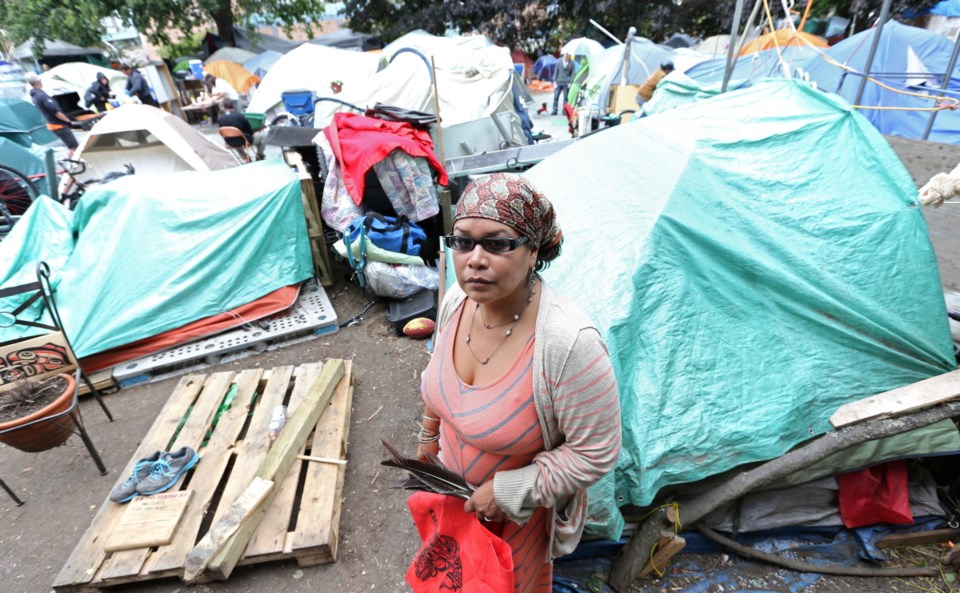The tent city homeless camp on the courthouse lawn must shut down, a B.C. Supreme Court judge ordered in a ruling Tuesday.
Chief Justice Christopher Hinkson ruled in favour of the province’s latest bid to close the camp based on evidence of deterioration and safety concerns described in court last week.
“I have come to the conclusion that the encampment is unsafe for those living there and for the neighbouring residents and businesses and cannot be permitted to continue,” Hinkson wrote in his decision to grant the province an injunction to close the camp.
He noted the residents’ inability to comply with repeated fire orders, an increase of crime, health risks such as rats, discarded needles and condoms, as well as the breakdown of leadership in the camp.
Hinkson ordered that the dismantling of tent city begin immediately and all structures cleared and residents moved by no later than Aug. 8, when a former Johnson Street care home purchased by the province to house the campers is ready.
No new residents will be allowed in tent city. At least 26 moved out on the weekend as spaces were made available at the Choices transitional shelter in View Royal. Those campers were promised first dibs on permanent housing.
“The province got what they asked for, and I’m not surprised,” said Stephen Portman from Together Against Poverty Society, a non-profit legal advocacy group that helped represent tent city residents in court.
“But the judge required homeless to have a home in order to move them. So who’s won here?”
Portman said the amount of housing secured for homeless people in Victoria because of tent city is unprecedented.
Over the past eight months, nearly 200 units of transitional and permanent housing were secured by the province for tent city residents. This includes the purchase of three buildings and nearly $26 million in funding for spaces and services.
“I think the fundamental aspect of this decision that cannot be overlooked is that the judge is saying, when housing becomes available and that housing is open, only then can the province remove the residents of that tent city who have lived here for coming on 10 months,” he said.
Portman said he believed the vast majority are looking for housing and are anxious to move.
Don Allen, apartment building manager of the nearby Norwood Arms, said he felt relief when he heard an injunction had been granted.
“It’s finally over,” said Allen, who lost three tenants in the last month. “We were always on guard and scared to go out at night and to work in the early morning hours. It’s been a living hell.”
Chrissy Brett, who lives at tent city during the week, said she will be staying put despite the court ruling. “I’m not going anywhere,” said Brett, passing out eagle feathers to members of the media.
Brett said she thought the decision was absolutely fabulous for the 140 homeless people who will be able to fill up the facility on Johnson Street.
“But the decision does not address the 1,400 people here in Victoria. And it doesn’t address homeless across B.C. or Canada,” Brett said
About 70 to 100 people have lived at the camp since it was set up last year.
City bylaws prohibiting daytime camping are not applicable on the provincially owned property. The province made several attempts to close the camp through the courts after numerous complaints from neighbours, businesses and law enforcement.
In his previous decision, Hinkson ruled that homeless campers could stay despite concerns because it was a greater burden for them to be on the streets than in the camp and because they had nowhere else to go.
In the ruling released Tuesday, Hinkson noted that the nature of tent city had changed in recent months. He quoted a witness who had described himself as being homeless in Victoria for many years. The man said the residents of tent city were initially “local individuals whom I recognized from my time living on the streets.” But he now doesn’t recognize most of the residents and he believes many have come from other communities specifically to live at tent city.
The witness said he has chosen not to stay at tent city “because there were too many strangers with mental-health issues and drug addictions there. Many of my homeless friends have left the courthouse encampment.”
Based on the evidence presented to him, the chief justice said he found that “there has been considerable degeneration and deterioration in the health and safety circumstances at the encampment, and for those reasons conclude that the encampment poses a health and safety risk to both its residents and the residents and businesses in the area of the encampment.”
B.C. Housing Minister Rich Coleman said the province is pleased with the court’s decision.
“It’s important for us to have this type of decision to move forward and be able to house the people that are at the camp and take the camp down and bring back the safety to the community,” he said.
Stephen Hammond led a neighbourhood group called Mad as Hell in a campaign to close tent city. He said members who live across from tent city are “likely ecstatic right now. It’s been really hard on them.”
He said he hopes the province bans overnight camping at the courthouse park space after tent city is torn down. City of Victoria bylaws allow camping in parks between 7 p.m. and 7 a.m.
spetrescu@timescolonist.com
ldickson@timescolonist.com



